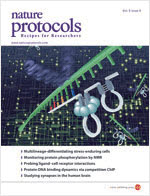- [Cover Paper]Design and use of synthetic regulatory small RNAs to control gene expression in Escherichia coli
- 관리자 |
- 2013-08-09 17:54:21|
- 12747
- 2013-08-09 17:54:21|
Design and use of synthetic regulatory small RNAs to control gene expression in Escherichia coli
- Journal name:Nature Protocols Volume:8, Pages: 1694–1707 Year published:(2013)
- DOI: doi:10.1038/nprot.2013.105 Published online 08 August 2013
- Abstract
-
Gene knockout experiments are often essential in functional genomics and metabolic engineering studies. However, repeated multiple gene knockout experiments are laborious, time consuming and sometimes impossible to perform for those genes that are essential for cell function. Small regulatory RNAs (sRNAs) are short noncoding RNAs in prokaryotes that can finely control the expression of target genes in trans at the post-transcriptional level. Here we describe the protocol for synthetic sRNA-based gene expression control, including sRNA design principles. Customized synthetic sRNAs consist of a scaffold and a target-binding sequence, and they can be created by simply replacing an existing target-binding sequence with one that is complementary to the target mRNA to be repressed, while retaining the scaffold. Our plasmid-based synthetic sRNA system does not require chromosomal modifications, and it enables one to perform high-throughput studies on the effects of knockdowns on host cell physiology, and it further allows the simultaneous screening of target genes in different Escherichia coli strains for applications in metabolic engineering and synthetic biology. Once an sRNA scaffold-harboring plasmid is constructed, customized synthetic sRNAs can be made within 3–4 d; after this time, the synthetic sRNAs can be applied to the desired experiments.
| 첨부파일 |
|
|---|


